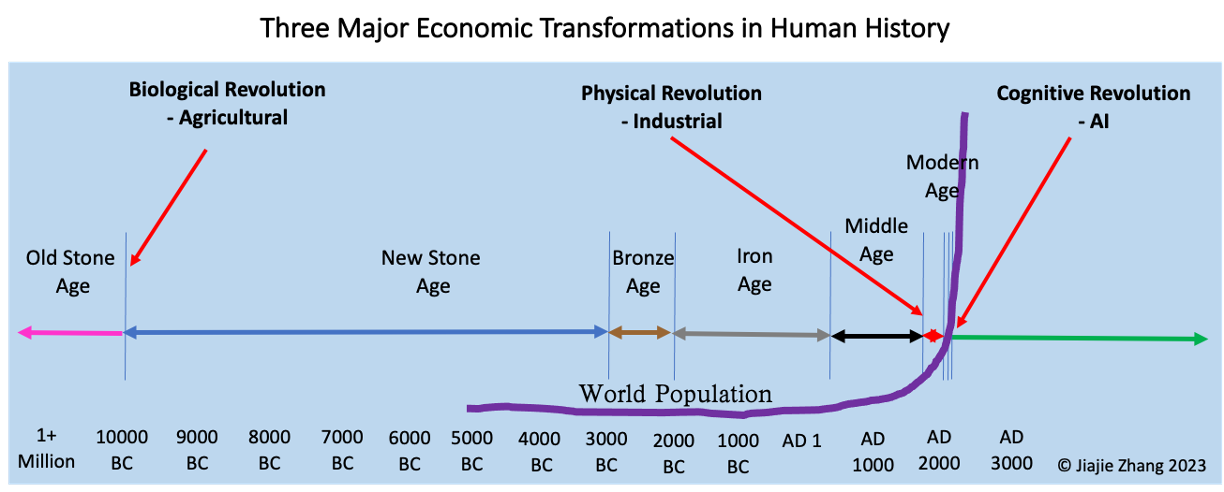
September 26, 2023
By Jiajie Zhang, PhD
Dean and Glassell Family Foundation Distinguished Chair in Informatics Excellence
McWilliams School of Biomedical Informatics at UTHealth Houston
We are in the beginning of the third fundamental economic transformation in human history – the Cognitive Revolution driven by artificial intelligence (AI) that is liberating people from cognitive labor through powerful computing, universal connectivity, and massive data. It is as fundamental as the other two economic transformations in human history. The Agricultural Revolution, a Biological Revolution, that took place around 10,000 BC liberated people from food insecurity via farming. The Industrial Revolution, a Physical Revolution, that took place 200 years ago liberated people from grueling physical labor through machines.
The Agricultural Revolution refers to the period around 10,000 BC when humans transitioned from a nomadic hunter-gatherer lifestyle to settled agriculture, which led to greater food security with a stable and reliable source of food through farming of crops and livestock. The Industrial Revolution, which began in the late 18th century, marked the transition from human muscle labor to machine-based manufacturing and automation, which increased productivity and economic growth. Today’s ongoing AI Revolution is similarly liberating people from cognitive labor by automating and streamlining many of the mental tasks that were previously performed by humans.
AI technologies such as machine learning, natural language processing (NLP), and computer vision can analyze vast amounts of data and generate insights and predictions that were previously impossible to obtain. For example, AI can help businesses automate customer service, optimize supply chains, and improve product recommendations. It can also help healthcare providers improve diagnosis and treatment of diseases and assist scientists in accelerating medical research and development. Moreover, AI has the potential to improve our overall quality of life by providing us with more personalized and efficient experiences. For example, AI can help us automate household tasks, personalize our entertainment and shopping experiences, and even drive our cars.
Data is the new oil and AI is the new engine that is transforming data to generate cognitive power. Oil has traditionally been a valuable resource that powers many aspects of our lives, from machinery, transportation to electricity generation. In the same way, data is now a valuable resource that drives many aspects of today’s society, including business, healthcare, education, entertainment, and scientific research. Just like crude oil needs to be refined and processed to be useful, raw data needs to be processed, analyzed, and transformed into information, knowledge, and intelligence. This is where AI comes in.
AI is a set of computational tools and methods that enable machines to learn from data, recognize patterns, and make predictions or decisions in the form of human assistants or automation. By using AI to process and analyze data, we can unlock its full potential and transform it into "cognitive power," - the ability to think, reason, and make decisions.
The timing of the AI revolution can be traced back with the help of big data analytics. The figure below shows the numbers of webpages returned by Google search for the keywords “Artificial Intelligence”, “Data Science”, and “Medical AI” normalized by the total number of webpages in the Google universe. As can be seen, 2012 is clearly the dawn of the AI Revolution. Looking back, 2012 is the year when the breakthrough in deep learning was demonstrated by Geoffrey Hinton’s team at University of Toronto at the 2012 ImageNet competition, where their system (Krizhevsky, Sutskever, & Hinton, 2012) outperformed its peers by a substantial margin in labeling images and got close to human level performance.
The ongoing AI Revolution is the latest in a series of transformative developments that have liberated people from different forms of labor, and is going to continue to reshape our societies and economies in profound ways.